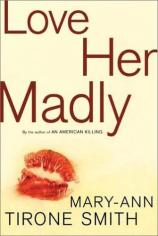Interview: February 1, 2002
February 1, 2002
In Mary-Ann Tirone Smith's latest thriller, LOVE HER MADLY, Rona Leigh --- a tiny wisp of a thing accused of hacking someone to death with an ax --- is about become the first woman executed in Texas since the Civil War. Of course, with the insatiably curious Poppy Rice on the case, Rona's promises to be a less than smooth and tidy execution. Learn more about the feisty Poppy, the intriguing Rona, George W. Bush, and more as Bookreporter.com writer Kate Ayers chats with the author.
TBR: I was reminded of all the things I like about other strong female detective characters when I was reading LOVE HER MADLY. Do you read Patricia Cornwell, Sue Grafton, or any contemporary female authors writing in the mystery/thriller genre?
MATS: I do read the writers you mention as well as Janet Evanovich, Sara Paretsky and many others, most not so well known. I believe my sleuth, FBI agent Poppy Rice, differs from the sleuths created by these authors in that she is less retrospective, more reckless.
TBR: I know Poppy appeared as a minor character in AN AMERICAN KILLING. What made you decide to draw her out and provide a venue featuring her? Is she modeled on anyone you know?
MATS: Poppy made the decision. She kept me awake nights with her pleas and threats, insisting I wasn't through with her. I wasn't. Poppy looks like my good friend, the essayist and travel writer, Sarah Clayton, but her persona reflects the kind of independent, strong-willed, free-spirited woman I wish I could be. I'm no shrinking violet, but I'm no Poppy Rice either.
TBR: Rona is one of those characters that a reader carries around with them all day, thinking about her guilt or innocence, her religious beliefs, etc. Is that what happens during the writing process, too … do you find yourself "living" with her all day?
MATS: I feel gratified when a reader tells me a character has such an effect. I just had a reading at "Adventures in Crime and Space" in Austin and a young woman --- a student at the University of Texas --- arrived clutching my first novel, THE BOOK OF PHOEBE, first published in 1985. She told me her mother loved it and passed it on to her. She identified hugely with Phoebe and said it was the best book she'd ever read. Then she cried, so naturally I cried, and the bookstore owner did a great job getting me back on track again. The young woman's friend, who was no doubt dragged to the reading, said, "She's making everybody read your books. Like, ALL her friends! It's so totally good." When these things happen it means a lot to a writer.
But back to the essence of the question. I do not live with my character all day although, as I said, they do intrude on my sleep. I punch the clock and when I punch out again, I leave my work behind. I have a large life outside writing --- big family, many friends, a load of reading to do, of course, kayaking, and travel. I write every day even on vacation, but when I've put in my time, I'm off to the pool.
TBR: We meet Rona's alleged victims only through the stories other characters tell us, since the events happened seventeen years ago. How did you decide not to start the book at that point and then flash forward to the present day?
MATS: We all love secrets. The secrets come out after the event, sometimes long after. If I use colorful and careful details, the reader is willingly swept back, dying to learn the secrets as they slowly unfold. Also, the various ways different characters describe what they know or have witnessed is a way of bringing in their reactions and memories from a very personal viewpoint. The crime gains an immediacy beyond the usual tragedy and gore.
TBR: How do you personally feel about capital punishment?
MATS: The important thing here is how Poppy Rice feels. Personally, she's come to find herself at odds with the ultimate punishment for reasons that come out during the course of the book. But her driving force is seeking justice under the law --- a prisoner deserves a fair trial along with a sentence that is fair; the latter is a decision ultimately in the hands of the governor.
TBR: Is there a little bit of George Bush in your Texas governor?
MATS: Speaking of the governor... My Texas governor, like George Bush, is an attractive man with a good ole boy personality. Unlike George Bush, however, he never gave up alcohol.
TBR: You gave your readers great information about the Shakers, without overloading us. Did you do a lot of research on the religion?
MATS: I did enough research to discover the key tenets of the Shaker religion --- hard work, self-reliance, celibacy and the belief that the second coming of Christ was, or will be, a woman depending on the particular Shaker sect.
TBR: What was your writing process like for LOVE HER MADLY? Was it any different from that which you did for your previous books?
MATS: The process is the same. The plot arises from the character who must have great depth in order to be accepted and trusted by the reader. I let the character lead me to the plot. Without good and believable characters who cares about their story?
TBR: Any hints on what Poppy's next case will be, and when we can expect to see it on the shelves?
MATS: In one year, Poppy will be back. LOVE HER MADLY ends with Poppy ordered to take a vacation by her director. She has been injured and he wants her to regroup. So she goes to Block Island, for once not looking for trouble. But trouble finds her.




